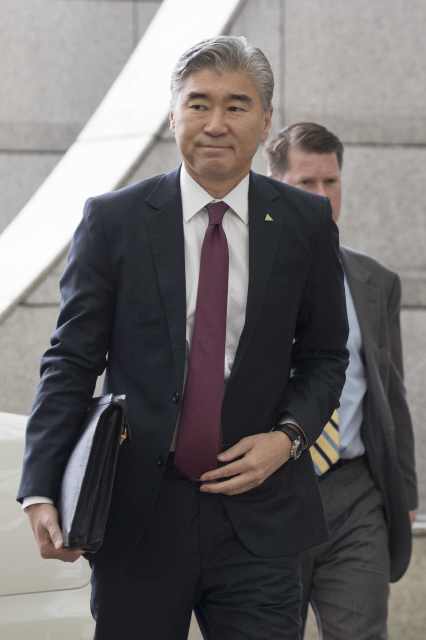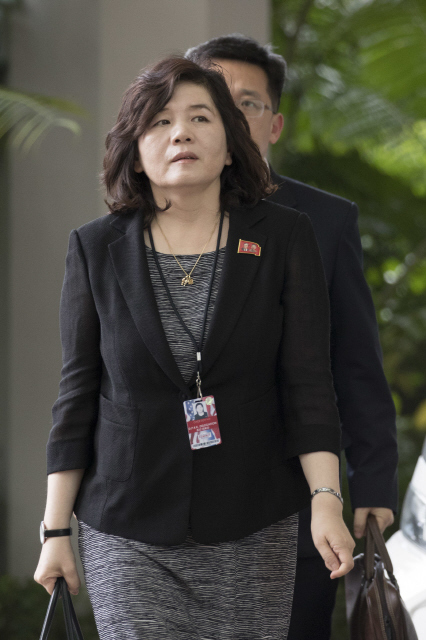Posted on : Jul.2,2018 16:31 KST
 |
|
Sung Kim, US Ambassador to the Philippines, on his way to negotiations with North Korean Vice Foreign Minister Choe Son-hee on June 12 in Singapore. (Kim Seong-gwang, staff photographer)
|
Sung Kim leads US delegation in preliminary negotiations
 |
|
Sung Kim, US Ambassador to the Philippines, on his way to negotiations with North Korean Vice Foreign Minister Choe Son-hee on June 12 in Singapore. (Kim Seong-gwang, staff photographer)
|
US Secretary of State Mike Pompeo will reportedly be visiting North Korea around July 6. Given the lack of progress in negotiations toward North Korea’s denuclearization and building a peace regime on the Korean Peninsula since the North Korea-US summit in Singapore on June 12, attention is focusing on whether Pompeo will be able to get those negotiations back on track.
US Ambassador to the Philippines Sung Kim is reported to have begun follow-up negotiations for the Singapore summit in Panmunjeom. Kim lead the US delegation during preparatory negotiations for the June 12 North Korea-US Summit in Singapore. Kim was seen entering Panmunjeom on July 1, where he assumedly spent around two hours negotiating with his North Korean counterparts, and returned to Seoul.
Kim met with North Korean Vice Foreign Minister Choe Son-hee during his preliminary negotiations for the Singapore summit, but it is unclear who his counterpart was this time. Kim’s meeting is the first known official contact between North Korea and the US following the Singapore summit.
 |
|
North Korean Vice Foreign Minister Choe Son-hee on her way to negotiations with US Ambassador to the Philippines Sung Kim. (Kim Seong-gwang, staff photographer)
|
Amid reports that Pompeo is likely to visit North Korea this week, Japanese public broadcaster NHK reported on June 29 that “Pompeo is leaning toward visiting Pyongyang on July 6 and then making a stop in Tokyo on July 7.” South Korean government officials are also saying it is about time for North Korea and the US to engage in follow-up negotiations.
Shortly after the June 12 summit, US President Donald Trump and Pompeo promised that follow-up negotiations with North Korea would be held soon. Given those remarks, there had been speculation among diplomatic circles about whether, in this case, no news was really good news. Multiple officials in the South Korean government had dismissed suspicions that North Korea and the US were sending anomalous signals and asserted that North Korea needed time for internal assessment and adjustment following the back-to-back summits with Trump and Chinese President Xi Jinping. The North needed time to work out the details of the denuclearization deal that Kim had signed and to work out its position about follow-up negotiations, these officials explained.
And indeed, Kim appears to have resumed public activities – including on-the-spot guidance – on June 30, a full ten days after his third summit with Xi on June 19 and 20. While no official meetings between North Korea and the US were confirmed during that time, the fact that North Korea refrained from criticizing the US around June 25, the anniversary of the Korean War, was taken to be a positive, if nonverbal, signal to South Korean and American officials.
Pompeo’s visit to North Korea will be the first high-level meeting between North Korea and the US since the Kim-Trump summit. The big question at this point is whether Pompeo’s counterpart in the talks will be Kim Yong-chol, vice chairman of the Workers’ Party of Korea (WPK) and director of the WPK United Front Department, or whether Kim’s role will be taken over by Foreign Minister Ri Yong-ho.
The key item to be discussed during the talks is likely to be the methodology of North Korea and the US’s negotiations about denuclearization and building a peace regime. Before moving forward with the American demands of denuclearization and verification and the disclosure of North Korea’s nuclear weapons, materials and facilities, which is the beginning of verification, the two sides must reach a compromise on what timeframe and quid pro quo their ongoing negotiations will involve.
“If the US asks for denuclearization, North Korea will ask for a security guarantee for its regime in return. If the North makes a specific request [for a security guarantee], the negotiations can begin; otherwise, there is unlikely to be much progress,” said a senior official with the South Korean government.
If North Korea and the US reach an overall agreement on the methodology of these negotiations, they could move forward with recovering and repatriating the remains of American troops who died in North Korea during the Korean War and shutting down a North Korean testing site for missile engines, as Kim and Trump have already promised. Some news sources reported that the Trump administration had asked for American experts to be allowed to observe the shutdown of the missile engine testing site, but that is apparently not true.
In related news, US intelligence officials have concluded that North Korea does not intend to denuclearize completely and is attempting to conceal nuclear weapons and major nuclear facilities, the Washington Post reported on June 30. Based on analysis of satellite images and computer hacking over the past few years, these officials believe that North Korea has at least one more secret nuclear facility in addition to its facilities at Yongbyon and Kangson.
By Kim Ji-eun and Hwang Joon-bum, staff reporters
Please direct comments or questions to [english@hani.co.kr]











